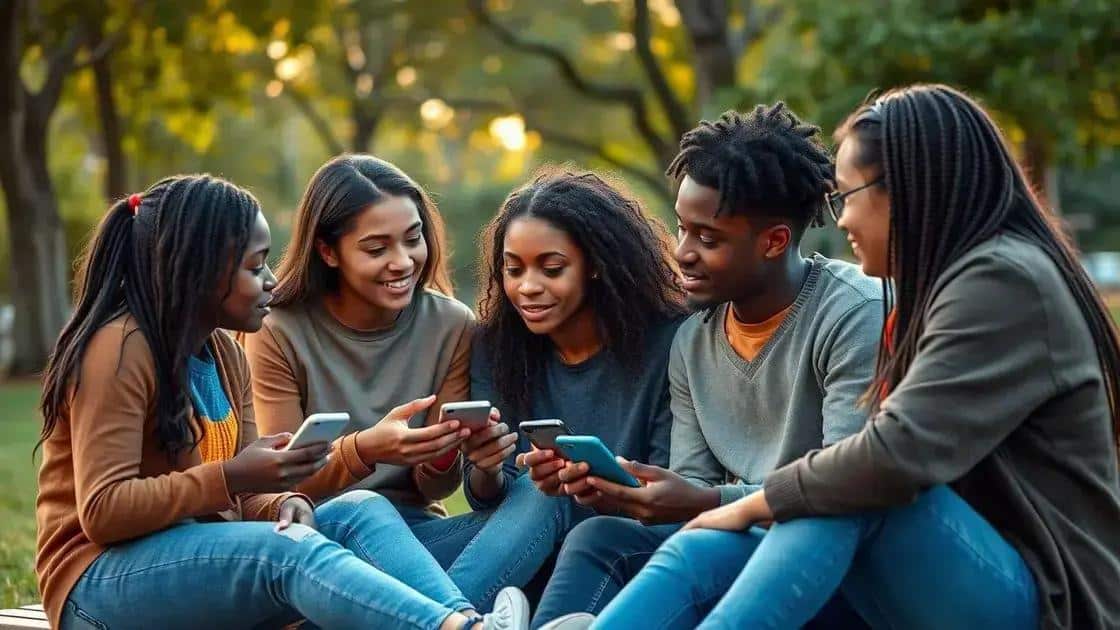Social media impact on youth mental health

The social media impact on youth mental health includes benefits like connection and support, but also challenges such as anxiety, comparison, and cyberbullying, necessitating healthy usage strategies.
Social media impact on youth mental health is a pressing issue. Have you noticed how online interactions shape the well-being of young people today? It’s worth exploring the complexities of this relationship.
Understanding the role of social media in youth lives
Social media plays a significant role in the lives of today’s youth. It shapes their interactions, influences their thoughts, and impacts their overall mental health. Understanding this role is essential for parents, educators, and the youth themselves.
Social connections through social media
Social media platforms allow young people to connect with friends and family, especially those who may be far away. This connectivity can provide emotional support and foster relationships. However, it can also lead to feelings of inadequacy or anxiety when comparing themselves to others.
Expression and identity
Through social media, youth express themselves and explore their identities. It offers a space to share thoughts, creativity, and experiences. This aspect is vital for their personal development, but it can also lead to challenges such as cyberbullying or negative self-image.
- Positive aspects of expression: Creativity and self-discovery.
- Negative implications: Cyberbullying and pressure to conform.
- Influences on behavior: Trends that can lead to risky behaviors.
Moreover, social media can perpetuate trends that influence behavior. Young people often feel pressured to engage in activities they see online. These influences can be positive, like promoting healthy habits, or negative, such as encouraging unsafe behaviors.
Despite the challenges, social media also offers educational opportunities. Youth can access information and support through various platforms. They can connect with communities that share similar interests or challenges, which can be empowering. Recognizing the dual nature of social media is crucial for both understanding its role and navigating its effects on mental health.
The positive aspects of social media usage

Many young people enjoy using social media for various reasons. One of the key benefits is the ability to connect with others. Through these platforms, youth can build friendships and maintain relationships that might otherwise fade.
Encouragement and support
Social media provides a space for support and encouragement. Friends can share achievements, and family members can stay updated on each other’s lives. This emotional connection is vital for mental well-being.Online communities often form around common interests. These spaces can foster friendships and provide a sense of belonging.
- Finding like-minded individuals: Common interests foster connections.
- Sharing experiences: Support during tough times.
- Access to resources: Information on topics that matter.
Furthermore, social media can be a powerful tool for self-expression. Platforms allow youth to share their creativity, thoughts, and opinions with a wider audience. They can showcase their talents, whether it’s art, music, or writing. This ability to share experiences can enhance their confidence and encourage greater creativity.
Additionally, social media can serve as an educational tool. Youth can follow pages that promote learning and personal growth. They can access valuable information on current events, social issues, and health topics, which can further their understanding of the world around them. Such knowledge is crucial in helping them become informed and engaged citizens.
Mental health challenges linked to social media
While social media has positive aspects, it also presents significant mental health challenges for youth. Many young users face pressure to maintain a certain image or lifestyle online. This pressure can lead to feelings of anxiety and low self-esteem.
The impact of comparison
Constantly comparing oneself to others on social media can create anxiety. Young people often see posts that depict perfect moments, which may not reflect reality. This comparison can make them feel inadequate or unsuccessful.
- Negative self-image: Comparing to curated lives of peers.
- Increased stress: Pressure to conform to trends.
- Cognitive overload: Feeling overwhelmed by information.
Additionally, cyberbullying is an unfortunate reality on social media. Individuals may face harsh comments or online harassment, leading to serious emotional distress. The anonymity of the internet can embolden negative behaviors, making it important to recognize its impact.
Fear of missing out (FOMO)
Another challenge is the fear of missing out (FOMO). Young people may feel anxious when they see others participating in events or activities. This feeling can lead to a constant need to check social media, contributing to feelings of isolation when not included.
Furthermore, excessive social media use can disrupt daily activities. Young people may find themselves spending too much time online, leading to a lack of in-person interactions. This can further exacerbate feelings of loneliness and depression. Addressing these challenges is crucial for promoting healthier social media habits among youth.
Strategies for healthy social media habits

Establishing healthy social media habits is vital for youth. By being mindful of their usage, young people can maintain their mental well-being while enjoying the benefits of online platforms. It is important for them to set boundaries and recognize when it’s time to unplug.
Setting time limits
One effective strategy is to set time limits on social media usage. This can help reduce the risk of excessive scrolling and encourage more face-to-face interactions. Young people can use apps that track their social media time and implement reminders to take breaks.
- Use timers: Limit usage to specific intervals.
- Schedule breaks: Plan offline activities during the day.
- Engage in hobbies: Replace screen time with creative outlets.
An additional strategy is to curate their feed. Youth should follow accounts that promote positivity and personal growth. By surrounding themselves with uplifting content, they can create a more supportive online environment.
Practicing mindfulness
Practicing mindfulness is another crucial habit. It encourages awareness of one’s feelings while using social media. If a post triggers negative emotions, it’s essential to step back and evaluate the impact. Mindful users can ask themselves how certain content makes them feel and adjust their interactions accordingly.
Moreover, communication plays a significant role in healthy habits. Encouraging open discussions about social media experiences can help youth express their feelings and seek support when needed. Family and friends can work together to promote a balanced approach to social media use.
In summary, understanding the social media impact on youth mental health is crucial in today’s digital age. While social media offers benefits like connection and creativity, it also poses challenges such as anxiety, comparison, and cyberbullying. Implementing healthy social media habits can help enhance the positive effects and mitigate the negative ones. Encouraging open communication, mindfulness, and responsible usage can lead to a healthier online environment for youth. Promoting a balanced approach will ensure that social media serves as a tool for growth rather than a source of distress.
FAQ – Questions about Social Media Impact on Youth Mental Health
What are the positive effects of social media on youth?
Social media helps youth connect with friends, share interests, and find support through various online communities.
How can social media cause mental health issues?
Social media can lead to anxiety and low self-esteem due to comparison, cyberbullying, and the pressure to maintain a certain image.
What strategies can help promote healthy social media habits?
Setting time limits, curating positive feeds, and practicing mindfulness can help youth manage their social media use better.
Why is open communication about social media important?
Discussing experiences and challenges can help youth express their feelings, seek support, and promote understanding among peers and adults.






